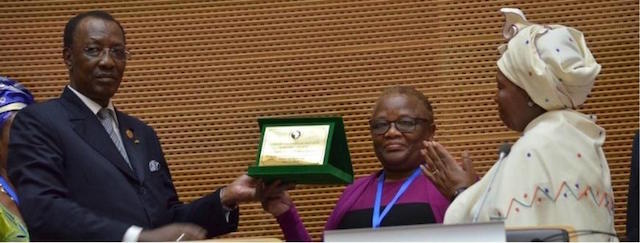By Ronald Joshua | IDN-InDepthNews Report
ADDIS ABABA (IDN) – The African Union Commission (AUC) has bestowed two distinguished African Scientists with the prestigious Kwame Nkrumah Continental Scientific Awards 2015, sponsored by the European Union since 2009 as a sign of recognition for top African scientists at national, regional and continental levels.
The award is named after Ghanaian nationalist leader and a pan-African who led the Gold Coast’s drive for independence from Britain and presided over its emergence as the new nation of Ghana. He headed the country from independence in 1957 until he was overthrown by a coup in 1966. An influential 20th-century advocate of Pan-Africanism, he was a founding member of the Organization of African Unity (OAU), predecessor of today’s AU.
Kristalina Georgieva, Vice-President of the European Commission in charge of Budget and Human Resources presented the awards in the presence of Dr. Nkosazana Dlamini Zuma, Chairperson of the African Union at the opening ceremony of the 26th African Union Heads of State and Government Summit in Addis Ababa, Ethiopia, on January 30.
Prof. Tebello Nyokong of the Rhodes University, South Africa bagged the ‘Science, Technology and Innovation Award’ for her work in the field of nanoscience, in particular for applications in the health and environment areas. She has received many international awards including the L’Oréal-UNESCO award for ‘Women in Science’ in 2009.
A previous laureate of the regional awards for female scientists is the current President of Mauritius, Professor Ameenah Gurib-Fakim, for her work in phytochemistry.
Prof. Umezuruike Linus Opara from Nigeria, based at Stellenbosch University, South Africa, was honoured with ‘For Life and Earth Sciences Award’, for his work in agricultural engineering, in particular on postharvest research. He Opara has received several international awards including the IMPRESSA Award (Impact Research and Science in Africa) by the Regional Universities’ Forum for Capacity Building in Agriculture in Africa (RUFORUM) in 2014.
“Each of the awardees smiled home with a cheque of 100,000 USD to further boast their research capacity in the fields of Basic Sciences, Technology and Innovation and Life and Earth Sciences,” said a press release.
Speaking on behalf of the awardees, Prof. Nyokong expressed optimism that African scientists will make good progress towards a healthier and better Africa in the next decade, particularly in finding solutions to the biggest problems on the continent.
The event was moderated by Martial De Paul Ikounga, the African Commissioner for Human Resources, Science and Technology who explained that the Kwame Nkrumah Continental Scientific Awards is awarded at three levels – national, regional and continental – with the objective to honour the African men and women in science who distinguished themselves by their contribution to African development through their work in the field of research and training.
Dr. Nkosazana Dlamini Zuma, Chairperson of the African Union Commission, underlined in her statement that Africa is a leading global player in terms of abundant human and natural resources, which if strategically capitalized will immensely contribute to Africa’s developing growth story. She added that the economic productivity of Africa is tightly linked to the scientific and technological skills of the African workforce.
In this regard and in order to deliver on the rising aspirations of African citizens and global expectations, the AU Agenda 2063 is underpinned by Education, Science and Technology as enablers for achieving national, regional and continental development imperatives. (Full speech of the Chairperson on the AU website www.au.int).
In a statement, the delegation of the EU to the African Union said the European Union’s support for the Kwame Nkrumah Scientific Awards is part of the EU-Africa collaboration in Science, Technology & Innovation (STI), under the Human Development component of the Joint Africa-EU Strategy (JAES).
This comprises budget support to the AUC’s Department of Human Resources, Science & Technology (HRST) led by Commissioner Martial De-Paul Ikounga, as well as support for the African Union Research Grants (AURG), which will launch its next call for proposals in the coming weeks with a budget of €8.5 million (about $9.5 million).
In addition, there is a very active High Level Policy Dialogue (HLPD) on STI mediated by the EC and AUC and involving Member States from both regions. The HLPD has identified a set of research priorities for Food and Nutrition Security and Sustainable Agriculture, which was endorsed at the last EU-Africa Summit and is being implemented through Horizon 2020 and AURG programmes.
The delegation of the EU to the African Union explains on its website: To implement the Joint Africa EU Strategy, Africa and the European Union ate committed to work closely together to secure appropriate funding.
The Partnership Document states that the financing of the Joint Africa EU Strategy is a joint responsibility that goes far beyond the European Commission: “Where possible [Community] instruments will be complemented by further contribution by EU Members States. Moreover, whenever possible, African financial instruments and AU Member States shall contribute to this process and an involvement of African financial institutions such as the African Development Bank will be ensured as appropriate “. [IDN-InDepthNews – 5 February 2016]
Photo: Award ceremony | Credit: African Union Commission
2016 IDN-InDepthNews | Analysis That Matters
Send your comment | Subscribe to IDN newsletter
Follow us on Twitter and Facebook:
http://twitter.com/InDepthNews
http://www.facebook.com/IDN.GoingDeeper

